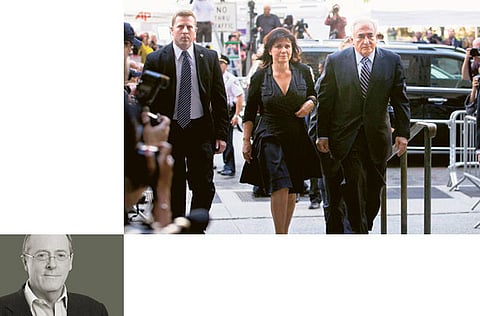Twisting the simple truth
Mixing of semantic issues and apparent falsehood distorts the presentation of reality

A host of information, in the past weeks, has led to confusion, not to say perplexity. Let us take some examples from a few issues.
Former IMF chairman, Dominique Strauss Kahn, for instance: ‘DSK has been cleared by Prosecutor [Cyrus] Vance', a headline anybody could read in newspapers and on TV screens. French socialist contender Martine Aubry, in line with her party's usual lack of sense of reality, declared on August 25 that ‘there was now proof that rape had not occurred'.
One could obviously stop there — as incidentally many French compatriots do. Others, on the contrary, could go on reading what Vance actually said: "The sexual act was probably not consented to but lies by the plaintiff cast a shadow over her accusation which, consequently, raises the risk not to be taken into consideration, beyond any reasonable doubt, by the jury members." Doesn't it sound a bit different?
For the sake of their reputation, 80 per cent of the French fortunately consider that DSK should not run for the next presidential election and 58 per cent feel he should not even be a member of a socialist government, should President Nicolas Sarkozy be defeated in the next presidential election. Apparently, DSK's networks and lobbies in the US have been more efficient there than in France. Now take a look at Libya and the fantastic victory of the Libyan people against their tyrant. Whoever listened to or looked at the insurgents, their way of fighting and coordinating cannot but be impressed by the successful move on Tripoli.
This performance is all the more remarkable when contrasted against the comments of all military chiefs, claiming that the Nato strikes alone could not secure victory unless foreign troops — were involved on the ground; which of course, beyond the fact it was not authorised by the UN resolution, obviously never happened. Hence, the presence of foreign ‘military advisors' who, as some nasty observers commented, were rather difficult to differentiate from troops.
Actually, it was a new style of colonial war, results of which appear sooner or later. Winners will meet soon to ‘reconstruct' a country they contributed to destroy. But no one doubts that the 12 feuding tribes, including a mix of separatists, Islamic activists and former Gaddafi supporters, will all meet and move peacefully towards a brighter future.So many other examples come to mind. Surely, the Israeli-Palestinian issue has been a major case, where words have been distorted and the presentation of reality deeply falsified over the years. Remember the ‘security fence', a fantastic attempt to curtail basic human rights of the Palestinian people, that simple minds would have simply called ‘a seven-metre high concrete wall'. It reminds me of former US secretary of state Colin Powell's words at the UN in 2002 (‘I have the proof…') or those of former UK prime minister Tony Blair, with his unforgettable comments about the risk of ‘London being hit by Iraqi missiles …'.
Actually, as the examples show, the point where semantic issues merge with real lies is not that far in such situations. Have a look at Syria. Everybody knows ‘what's happening there', simply because TV channels such as Al Jazeera or Al Arabiya tell us. But when other witnesses try to make their voices heard — I think of the Catholic nun in charge of a monastery near Qara and her moving article about the situation in her country —nobody listens to them.
"Today," she writes, "there is no doubt that there is a foreign intervention and there is no doubt that in some places, opposition has turned into an armed insurrection committing atrocities against the population, police forces and the army as well." The fact that in Syria the situation might be more complex than what is shown on TV is apparently of no interest, as long as it doesn't fit with the agreed intellectual vision of who tells us what to think. People and countries have lived for years with lies and misrepresentations but at the end of the day, the impact on democracy is terrible. Whom to believe? Worse, reasoning becomes altered, until it disappears completely and leaves only room for biased information.
Here is an example of comments by certain sections of the French press: Do you know why Islamist activists are gearing up these past [dfew] weeks, attacking places such as Afghanistan or a few days ago in Abuja, Nigeria? Because ‘they are in total despair due to the on-going Arab Spring'. Thus, people go on erecting ‘defensive walls which prevent attacks' but go on being hit anyway, as we recently saw in the Sinai. Some others declare that ‘there are no foreign troops on the ground' but only ‘military advisers', whose real names actually are British SAS or French Special Forces. However, one question remains: In the end is democracy the winner?
Luc Debieuvre is a French essayist and a lecturer at IRIS (Institut de Relations Internationales et Stratégiques) and the "FACO" Law University of Paris.


